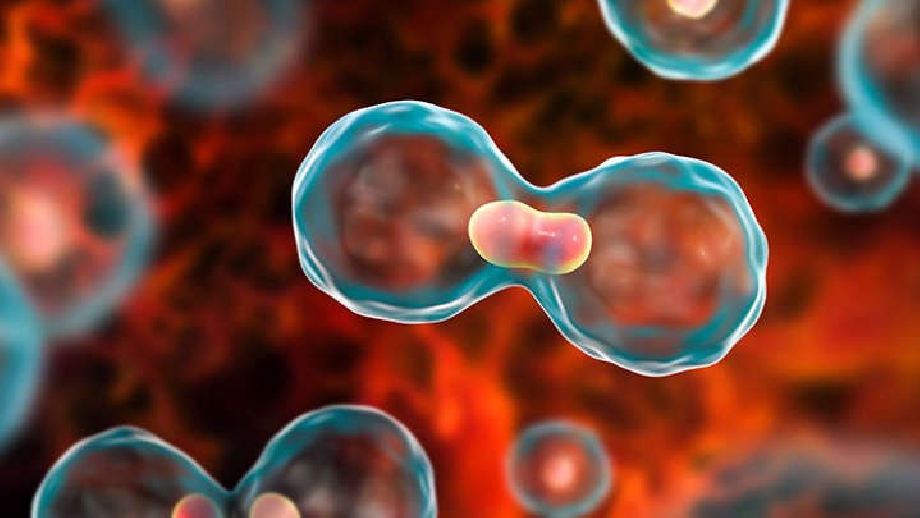
Claim: Fasting can be used in the treatment of cancer.
Verdict: MOSTLY TRUE.
Although fasting has been proven effective in treating cancer, it is not a cure.
Full Text
Cancer is a leading cause of death worldwide, accounting for ten million fatalities in 2020, according to the World Health Organization (WHO). Simply put, nearly one in every six deaths is caused by cancer.
The most common cancers are breast, lung, colon and rectum, and prostate cancers. A cause of death of this magnitude is a serious concern for the patient, close ones, and society at large.
This concern has led to serious medical research with corresponding useful findings. You can find some of these breakthroughs here, here, and here.
Amid these many innovations and findings is the claim that fasting can be used to treat the dreaded health condition.
A Twitter account, LivertySavage (@AxelSavage4) wrote, “… fasting is one of the cures for cancer that the establishment does not want you to know about.”
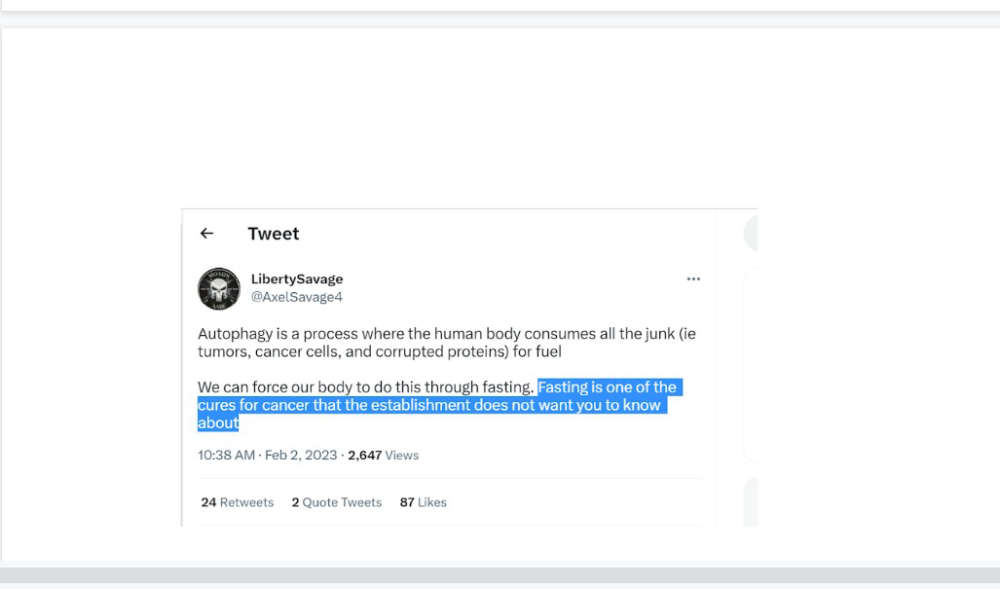
Screenshot of tweet from @AxelSavage4
Another Twitter user, Axel (@LibertySavage01) wrote, “Fact: Fasting cures cancer.”

Screenshot of tweet from @LibertySavage01
Here, another user, SBitcoinHoarder (@BHoarder1), also asserted that this is a fact doctors won’t tell the public because they are not provided with this information. He also insinuated that pharmaceutical companies control this narrative.
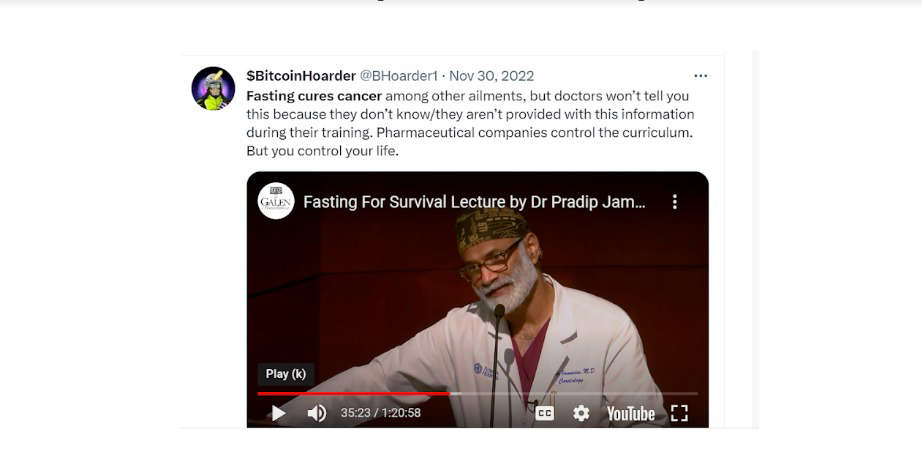
Screenshot of tweet from @BHoarder1. Source: Twitter
Combined engagement on these tweets is over 2,798. While some users believed the claim to be true, others did not. For example, a comment on @BHoarder1's tweet noted this was untrue.

Screenshot of engagement under @BHoarder1’s tweet. Source: Twitter
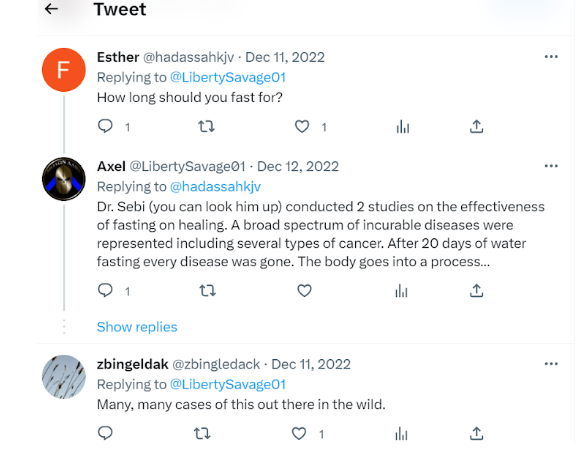
Screenshot of engagement under @LibertySavage01’s tweet. Source: Twitter
Based on these mixed engagements, we fact-checked this claim to ascertain its veracity and set the record straight.
Verification
We investigated a quoted YouTube video by one of the claimants, @BHoarder1. The video is a 2019 presentation by Pradip Jamnadas (medical doctor) who made a biochemistry case for fasting. According to his presentation, one of the benefits of fasting is that it helps kill cancer cells. He mentioned this between the 34th and 36th minutes of the video.
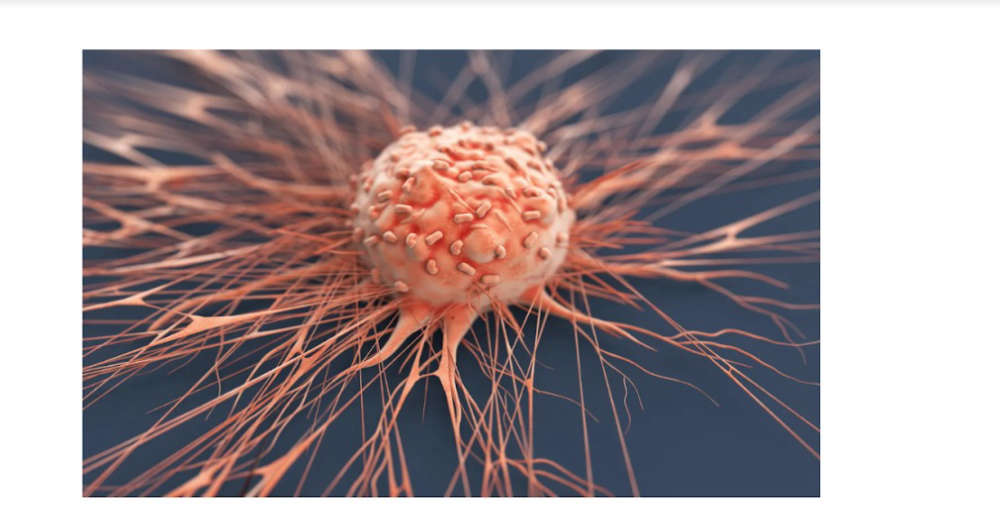
Screenshot of an image of a cancer cell. Source: Google
In Search of Supporting Evidence
The National Library of Medicine (US) published a piece on PubMed.gov in October 2022 titled Effect of fasting on cancer: A narrative review of scientific evidence.
The report stated that “emerging evidence suggests that fasting could play a key role in cancer treatment by fostering conditions that limit cancer cells' adaptability, survival, and growth. It added that fasting could increase the effectiveness of cancer treatments and limit adverse events.”
However, it says it is difficult to establish a link between fasting and the prevention and treatment of cancer.
The report, therefore, recommended a combination of prolonged periodic fasting with a standard conventional therapeutic approach to promote cancer-free survival, and treatment efficacy, and reduce side effects in cancer patients.
An article by Healthline.com says recent animal studies and a few preliminary human trials have shown a decrease in risk for cancer or a reduction in cancer growth rates. It states the result may be due to the following effects from fasting: decreased blood glucose production, stem cells triggered to regenerate the immune system, balanced nutritional intake, or increased production of tumor-killing cells.
Another article by Medicalnewstoday.com wrote that some research suggests that fasting helps fight cancer by lowering insulin resistance and levels of inflammation. Fasting may also reverse the effects of chronic conditions such as obesity and type 2 diabetes, both risk factors for cancer.
BreastCancer.org reported in its November 30, 2021, research news article that humans were first used in the trial other than animals.
The article titled Intermittent Fasting May Help Cancer Treatments Work Better, Small, Early Study Suggests that a specific type of intermittent fasting is safe and possible for people diagnosed with cancer and may boost the effectiveness of cancer treatments such as chemotherapy, immunotherapy, and hormonal therapy. It’s the first time this type of intermittent fasting has been studied in people.
Expert Opinion
An Oncologist, Jummai Jimeta, said she does not know much about the claim.
“not much is known about this claim, and in the instance, there is any chance of it, then it has not been well researched,” she said. Jummai Jimeta is the secretary general of Nigeria's Association of Radiation and Clinical Oncologists.
The company doctor at AIM group limited, who also hosts ‘health and safety cafe’ on 99.3 Nigeria Info FM Lagos, Frederick Unuigbokhai, submitted that “it is true that fasting has a lot of benefits, but with regards to cancer, findings are still very young.”
While agreeing that findings and many breakthroughs have been recorded with animal models, Mr. Unuigbokhia added that “the findings on the ground are not enough to run with.”
Conclusion
Available evidence shows that although fasting has been proven effective in treating cancer, it is not a cure.
The claim that fasting can cure cancer has been well-researched in the medical field. Although not much work has been done on human trials of this treatment method, it has been proven with animal trials that fasting can be effective in treating cancer.
However, early detection remains the best approach to fighting cancer effectively.


